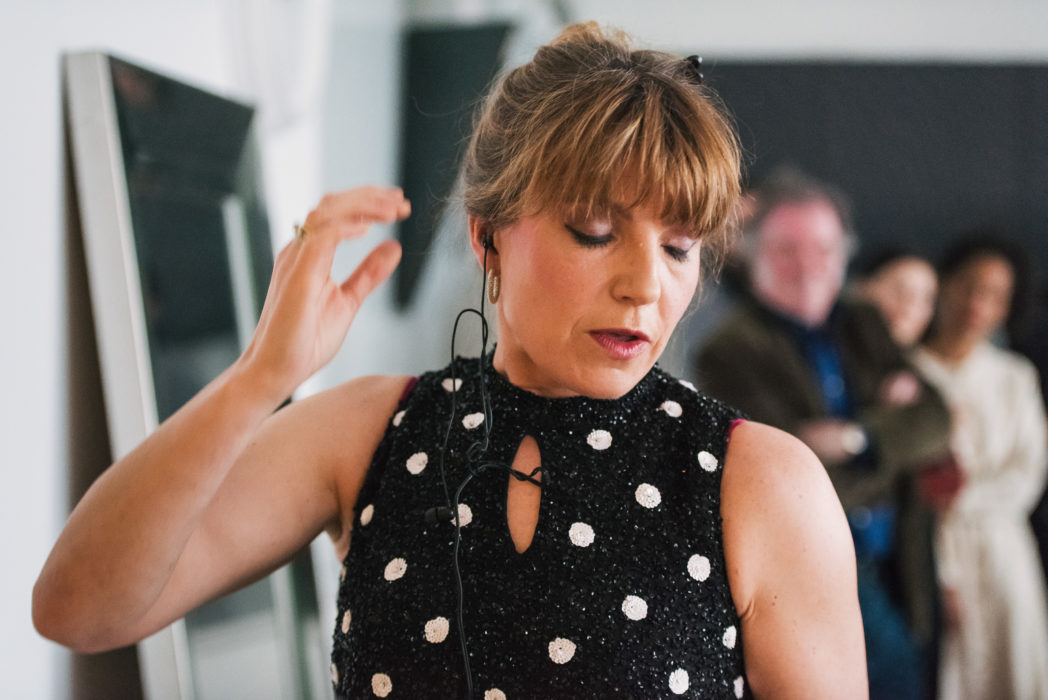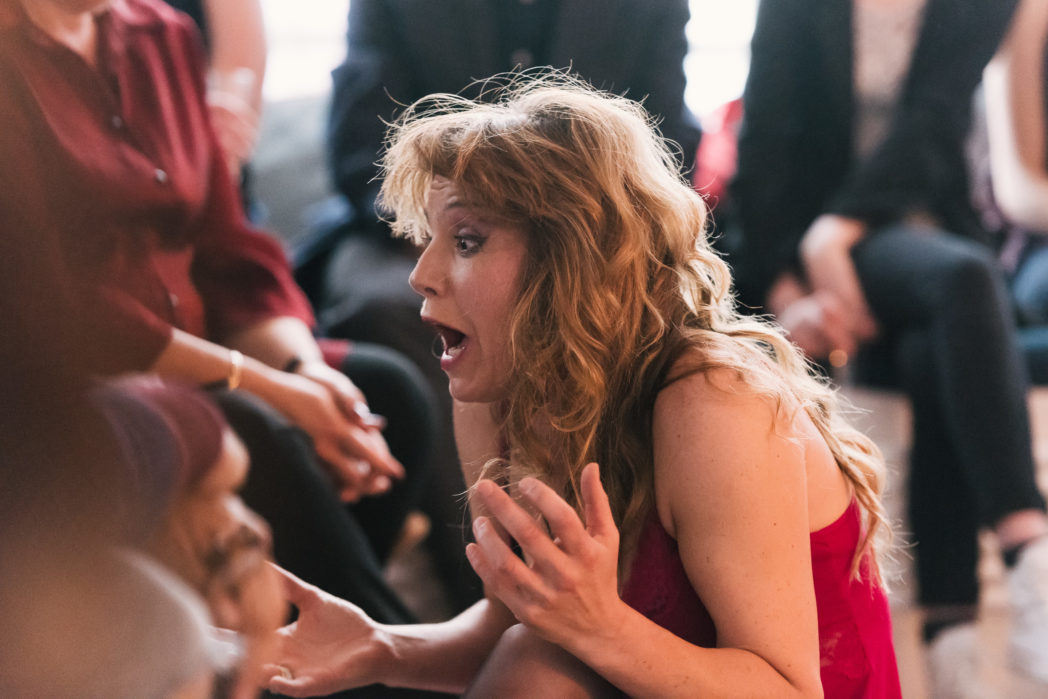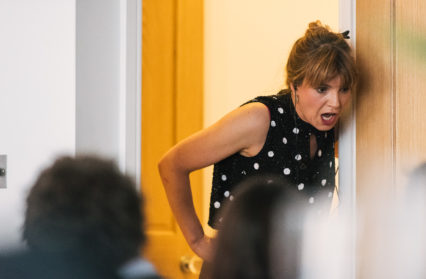Steph Power casts a critical eye over a production of La Voix humaine at the Cardiff Festival of Voice with music by Francis Poulenc.
Away from the hype-heavy official opener to the inaugural Cardiff Festival of Voice on June 3, a seaside apartment in Penarth hosted a far smaller scale FOV event which packed a mighty vocal and dramatic punch. No frills, no fanfare, this was opera at its most intimate and emotionally intense.*
Francis Poulenc has all-too often been disparaged as a second-rate composer, albeit acknowledged – as if in compensation – as the best known and most accomplished of the 1920s Groupe des Six; a loose association of chic enfants terrible. Certainly, Poulenc’s music at this time tended to the urbane, witty and apparently flippant, earning him the epithet, ‘colourful’. But his later vocal writing – both sacred and secular – is amongst the most ravishing and sympathetic of the 20th century, and his 1957 Dialogues des Carmélites is one of the few postwar operas to have become a staple of the large-scale international repertoire.
In truth, people were often challenged by the supposed contradiction of Poulenc’s position as an openly gay bon viveur who drew ever more devoutly towards catholicism following the death of a lover in a car accident in 1936. In that tragedy’s wake, vying with his bright disposition, Poulenc grew familiar with an interlocking spiral of depression, tranquillisers and sleeping pills. Some two decades later, it was the death of another lover and enforced separation from another still which prompted his agreement, post-Carmélites, to set La Voix humaine; a play written by his old friend, the sometime Les Six guru Jean Cocteau, in 1928.

Far from the surreal gambols or neoclassical cool associated with that group and that decade, Cocteau’s play is unflinchingly naturalistic and direct. Poulenc follows him closely with a stripped-bare evocation of abandonment and loss that soprano extraordinaire, Claire Booth, rendered harrowing in WNO artistic director David Pountney’s living room production. In a sustained monologue tragédie lyrique, a string of broken telephone conversations chart the abandonment of a woman by her lover with painful, allegoric intensity. Here, however, the audience is not simply witness to L’s humiliation and breakdown but becomes part of her story.
We are invited to a party at an apartment overlooking the sea. Booth greets us at the door, offers hors d’oeuvres, a drink, convivial chat. Without warning, Christopher Glynn’s beautifully pre-recorded piano, emanating from somewhere near the kitchen cupboards that Booth will raid for pills and alcohol, signals the sonic arrival of Poulenc. And so begins the soprano’s wringingly plausible transition from gracious hostess to desperate would-be suicide – enacted amongst us, face-to-face. As Booth moves about the room she expertly judges, moment-by-moment, how to handle us and our responses while singing with astonishing control a role that is emotionally and vocally exposing under any circumstance. We become props, leant upon or swept aside; handed a mobile phone, a bottle of tablets.

But how far can we be useful emotional props; helpful to L on any level, as our better instincts call us to be in this real-unreal situation that so forcefully challenges the distinction between life and art? Ultimately we are mere bystanders in a mute audience, lacking the ‘Human Voice’ of Cocteau and Poulenc’s title. Once Booth eventually collapses, we can only file silently out; in effect abandoning L in her despair just as her lover does – regardless that he may even be a figment of her imagination, given ‘voice’ in any case through the piano in quasi-dialogue (the piano part is a reduction of Poulenc’s sensual orchestral score).
Herein lies the intensely personal dilemma that makes Pountney’s production and Booth’s performance so gripping. Just how often do we evade with polite smiles and chit-chat someone failing to mask their life of not-so-quiet desperation, as social etiquette demands they must? Conversely, how many of us have experienced to any degree that very desperation, and the fear of being rejected and alone which L confesses in such painful self-abasement to her unwavering, distant lover? In Richard Stokes’ plain-speaking English translation, furious outburst, grovelling apology and tender, lyrical reminiscence become disturbing mental contrasts. These are rendered the more powerful by the implacable, albeit patently not insensitive, ‘responses’ of the piano recording, to which Booth has no option but to rhythmically adhere.
Combining fringe theatre with pop-up opera, Pountney’s setting astutely references the kind of soirée that would have been grist to the Les Six mill, whilst – consciously or otherwise – invoking a kind of back-to-front, ironic association with T.S. Eliot’s highly personal play, The Cocktail Party. Popular in the ‘50s, by contrast, there an estranged couple are ultimately reconciled whilst the ‘other woman’ ends up a Christian martyr.
Back to Poulenc, the result here in Penarth is dizzingly claustrophobic, focusing laser-like upon our conflicting psychological impulses. Most impressive of all, since Booth cannot know how many people will turn up at her ‘party’, or where in the room they will end up sitting or standing – much less, how they will respond – each performance is bound to be utterly unique.**
* And the second stunning production of the past fortnight to explore total mental disintegration following the world premiere, in London, of Philip Venables’ operatic adaptation of Sarah Kane’s final play, 4.48 Psychosis. Staged at the Lyric, Hammersmith by the Royal Opera / Guildhall School of Music and Drama, of which Venables is joint Doctoral Composer-in-Residence.
** The soprano Claire Wild is performing the role on some evenings.
Beachcliffe Apartments, Penarth, Vale of Glamorgan, 3 June 2016
Music: Francis Poulenc
Libretto: adapted by the composer from Jean Cocteau’s play of the same title.
Director: David Pountney
L: Claire Booth
Pre-recorded piano: Christopher Glynn
A Welsh National Opera / Wales Millennium Centre co-production for Cardiff Festival of Voice.
Until 11 June 2016: wmc.org.uk: 029 2063 6464
Header photo credit Polly Thomas
Steph Power is a frequent contributor to Wales Arts Review.











